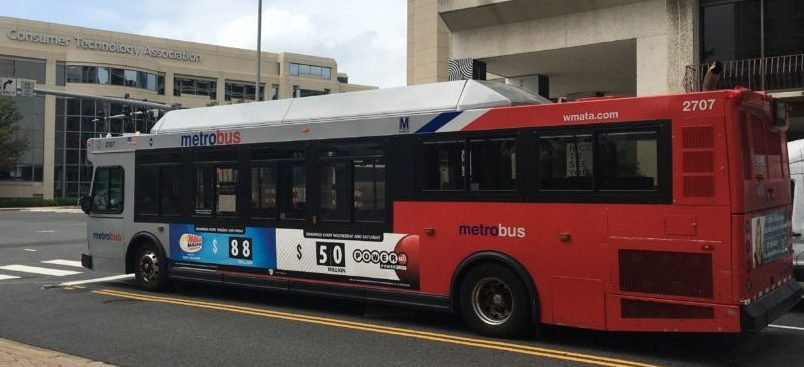Most D.C.-area commuters who ride the X2, the S9 express, or the Circulator probably just want their city buses to show up on time and weave safely through traffic. But at the D.C. Circuit, buses are becoming the newest forefront for the freedom of speech.
In two separate cases over the last three weeks, the court has weighed in on whether the Washington Metropolitan Area Transit Authority is violating the First Amendment by refusing to run certain types of advertising on its buses.
The ads at issue in the two cases could hardly be more different. One ad, submitted by the Catholic Church, depicts a peaceful Christmas scene under a starry sky and promotes charitable giving. The other ad, submitted by a controversial anti-Islam group, contains a provocative cartoon of the prophet Muhammad. WMATA refused to run both ads, citing a policy that prohibits religious-themed and issue-oriented advertising.
On July 31, in Archdiocese of Washington v. WMATA, a panel of the court rejected the Catholic Church’s claims that the agency violated its First Amendment rights by refusing to run the Christmas ad. (Circuit Breaker previously covered that decision here.) But on Friday, a different panel allowed the lawsuit by the anti-Islam group to proceed.
The group, the American Freedom Defense Initiative, wants to run an ad on city buses and in metro stations that depicts a drawing of Muhammad under the phrase “SUPPORT FREE SPEECH.” The group says the ad is intended as a critique of what it calls “Sharia-adherent Islamists who want to enforce so-called blasphemy laws here in the United States.” Many Muslims consider visual depictions of Muhammad to be verboten.
The American Freedom Defense Initiative is listed as an extremist hate group by the Southern Poverty Law Center. In 2015, the group sponsored a contest for cartoon drawings of Muhammad in Garland, TX. During that event, two gunmen, said to be inspired by the Islamic State, opened fire on security guards. Both gunmen were shot and killed.
The group has run anti-Islam ads on other cities’ transit systems, and in 2015, it submitted the Muhammad ad to WMATA. Up until that year, the agency had permitted all sorts of advertising, but shortly after receiving the application to run the Muhammad ad, it adopted a new policy that prohibits various categories of controversial ads, including those “intended to influence members of the public regarding an issue on which there are varying opinions.”
In American Freedom Defense Initiative v. WMATA, a district judge ruled in favor of the WMATA policy, finding that it did not infringe on the group’s free speech rights and ordering the lawsuit dismissed. On appeal, the D.C. Circuit took a fresh look and, in a divided opinion written by Judge Ginsburg, issued a three-pronged ruling.
First, the court followed the freshly minted precedent from the Archdiocese case and confirmed that metro advertising is a “nonpublic forum” under the First Amendment, meaning the government has more leeway to restrict speech than it does in other contexts. In nonpublic forums, restrictions are constitutional if they do not suppress particular viewpoints and if they are “reasonable.”
Next, the court found that WMATA’s ban on issue-oriented ads is viewpoint-neutral because, it said, there is no evidence that the agency has applied the policy in a discriminatory way. The Archdiocese panel similarly found that the ban on religious-themed ads is viewpoint-neutral.
But in its final holding, the court did not agree with the district judge that the case should be dismissed. It sent the case back down for further consideration of whether the ban on issue ads is “reasonable” in light of another new precedent: a June ruling from the Supreme Court in Minnesota Voters Alliance v. Mansky. In Mansky, the Supreme Court said that speech restrictions in nonpublic forums must be governed by objective standards and must not be subject to unbridled government discretion.
Griffith wrote that the district judge should consider whether WMATA’s prohibition on any advertisement that is “intended to influence members of the public regarding an issue on which there are varying opinions” is guided by enough objective criteria to satisfy Mansky. His decision to send the case back for consideration on that issue differs from the result in Archdiocese, in which the panel, relying in part on Mansky, found the ban on religious ads to be reasonable and did not order further findings by the district judge on that point.
Robert Muise, a lawyer for the American Freedom Defense Initiative, told Circuit Breaker he is pleased by the outcome of the Friday opinion.
“We live to fight another day, and I like our chances in light of Mansky,” Muise said.
The group’s Muhammad ad, he said, should not be subject to a heckler’s veto, and he described the transit agency’s concerns that the ad could incite violence—similar to what occurred in Texas—as an exaggerated fear.
“That’s not a legitimate basis for suppressing the speech,” he said. “I think those claims are overblown.”
WMATA did not respond to a request for comment.
The transit ad wars are sure to continue. Some see the D.C. Circuit’s Archdiocese ruling as a candidate for Supreme Court review. Meanwhile, American Freedom Defense Initiative will remain alive in the district court. And a third case challenging the WMATA ad policy—American Civil Liberties Union Foundation v. WMATA—also is pending in the district court and could make its way up to the D.C. Circuit soon. One of the ads at issue in that case is an ACLU poster that WMATA rejected. The entire content of the poster: the text of the First Amendment.
![]()

